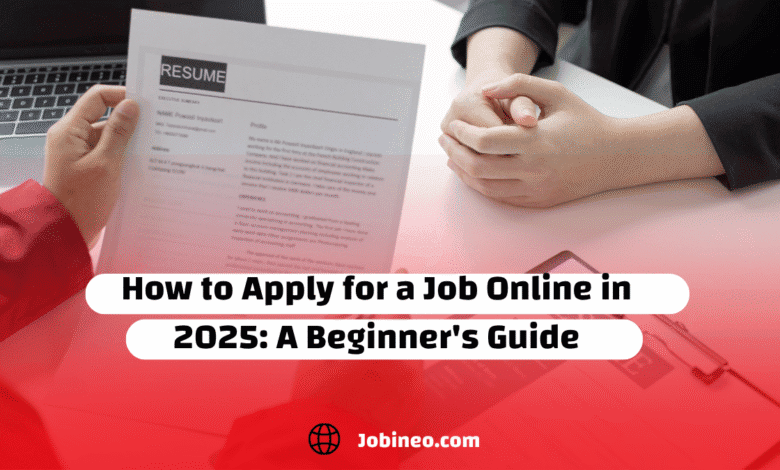How to Apply for a Job Online in 2025: A Beginner’s Guide

Introduction
Applying for a job online in 2025 has never been easier—or more competitive. With hundreds of job websites and digital application tools available, knowing where to start and how to stand out is key. Whether you’re looking for full-time work, remote jobs, or part-time gigs, this guide will walk you through the process step by step.
If you’re a beginner or someone who hasn’t applied for a job online in a while, don’t worry—this guide is made just for you.
Step 1: Choose the Right Job Search Platforms
| Platform Type | Examples | Best For |
|---|---|---|
| General Job Boards | Indeed, Glassdoor, Google Jobs | All types of job seekers |
| Remote Work Sites | Remote.co, We Work Remotely | Freelance and remote jobs |
| Company Websites | Careers pages | Applying directly to companies |
| Specialized Boards | Behance (design), Stack Overflow (tech) | Industry-specific jobs |
Start by selecting 2–3 platforms to focus on. Make sure to create an account and set up job alerts based on your preferred location, role, or work type (remote, part-time, full-time).
Step 2: Prepare a Strong Online CV
Before you hit “apply,” you need a job-ready CV. If you don’t have one yet, follow these tips:
| Tip | What to Include |
|---|---|
| Use a clean format | Keep it 1–2 pages, avoid clutter |
| Tailor each CV | Match the job title and keywords from the listing |
| Add essential info | Name, contact, skills, experience, education |
| Mention soft skills | Communication, teamwork, time management |
| Highlight achievements | School projects, certifications, volunteer work |
You can create your CV online using platforms like Canva or free CV builders. Save your CV as a PDF to maintain the format when uploading it.
Step 3: Read Job Descriptions Carefully
Don’t rush. Always take a few minutes to understand:
- What the employer is asking for
- Required qualifications
- Whether it’s a remote, part-time, or full-time role
- Application instructions (PDF CV, cover letter, etc.)
Reading job descriptions properly will help you avoid applying to mismatched roles and save time in your job hunt.
Step 4: Fill Out Applications Properly
Job application forms might ask for your personal details, education, and experience. Here’s how to handle them:
| Field | Tip |
|---|---|
| Name & Contact | Use a professional email |
| Resume Upload | Upload your latest CV in PDF |
| Cover Letter | Write a short, focused message |
| Skills | Use keywords from the job description |
| Experience | Be honest, include internships or volunteer work |
Always double-check your spelling and grammar before clicking “Submit.”
Step 5: Stay Safe from Scams
Online job search scams are real. Here’s how to stay protected:
| Warning Sign | What to Do |
|---|---|
| Vague job details | Avoid applying |
| Requests for payment | Never send money |
| Unprofessional emails | Check email domain and tone |
| Immediate job offers | Be cautious and research the company |
Use trusted platforms and don’t share sensitive info like your ID number or bank details unless you’re sure it’s a legitimate employer.
Step 6: Track and Follow Up
Use a simple spreadsheet or notebook to keep track of:
- The jobs you applied for
- Application dates
- Follow-up reminders
After 5–7 days, it’s okay to send a short follow-up email to check on your application. This shows your interest and professionalism.
Conclusion
Job searching online in 2025 can open doors to amazing opportunities—if you know how to approach it. By using trusted job boards, preparing a strong CV, applying with care, and avoiding scams, you’ll be ahead of the game.
Stay consistent, apply regularly, and keep improving your applications. Your next job could be just one click away.
Check also: How to Write a Strong Job Application Email


